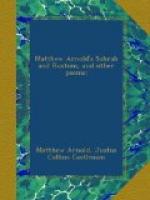=Greek Spirit in Arnold=.—But it is not alone in the fact that he selects classic subjects, and writes after the manner of the great masters, that Arnold’s affinity with the Greeks is manifested. His poems in spirit, as in form, reflect the moods common to the ancient Hellenes, “One feels the (Greek) quality,” writes George E. Woodberry, “not as a source, but as a presence. In Tennyson, Keats, and Shelley there was Greek influence, but in them the result was modern. In Arnold the antiquity remains—remains in mood, just as in Landor it remains in form. The Greek twilight broods over all his poetry. It is pagan in philosophic spirit, not Attic, but of later and stoical time; with the patience, endurance, suffering, not in the Christian types, but as they now seem to a post-Christian imagination, looking back to the past.” Even when his poems treat of modern or romantic subjects, one is impressed with the feeling that he presents them with the same quality of imagination as would the Greek masters themselves: and in the same form.
=Arnold’s Attitude toward Nature=.—In his attitude toward Nature Arnold is often compared to Wordsworth. A close study, however, reveals a wide difference, both in the way Nature appealed to them and in their mood in her presence. To Arnold she offered a temporary refuge from the doubts and distractions of our modern life,—a soothing, consoling, uplifting power; to Wordsworth she was an inspiration,—a presence that disturbed him “with the joy of elevated thoughts.” Conscious of the help he found in her association, Arnold urged all men to follow Nature’s example; to possess their souls in quietude, despite the storm and turmoil without. Pancoast says: “He delights in leading us to contemplate the infinite calm of Nature, beside which man’s transitory woes are reduced to a mere fretful insignificance. All the beautiful poem of Tristram and Iseult is built upon the skilful alternation of two themes. We pass from the feverish, wasting, and ephemeral struggle of human passions and desire, into an atmosphere that shames its heat and fume by an immemorial coolness and repose;” and the same comparison constitutes the theme for a considerable portion of his poetical work. In his method of approaching Nature, Arnold also differed widely from Wordsworth, in that he saw with the outward eye, that is objectively; while Wordsworth saw rather with the inward eye, or subjectively. In this Arnold is essentially Greek and more Tennysonian than Wordsworthian. Many of his poems, in full or in part, are mere nature pictures, and are artistic in the extreme. The pictures of the Oxus stream at the close of Sohrab and Rustum; the English garden in Thyrsis; and the hunter on the arras, in Tristram and Iseult, are all notable examples. This pictorial method Wordsworth seldom used. In spirit, too, the poets differed widely. To Wordsworth, Nature was, first of all, the abiding place of God; but Arnold “finds in the wood and field no streaming forth of beauty and wisdom from the fountainhead of beauty,” no habitancy of Nature’s God.




